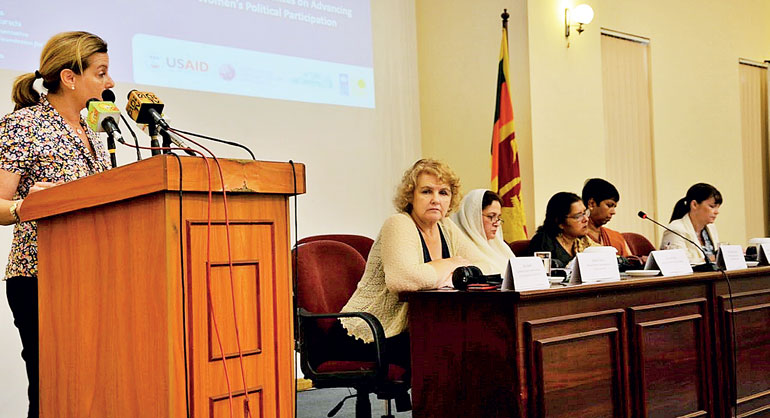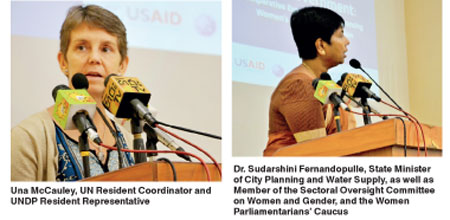Thursday Feb 19, 2026
Thursday Feb 19, 2026
Thursday, 3 August 2017 00:12 - - {{hitsCtrl.values.hits}}
Open discussion forum on operationalising the 25% quota for women in Local Government
 A discussion forum on operationalising the 25% quota for women in Local Government, and comparative experiences on advancing women’s political participation was held on Wednesday, 26 July, at the Lighthouse, Lakshman Kadirgamar Institute.
A discussion forum on operationalising the 25% quota for women in Local Government, and comparative experiences on advancing women’s political participation was held on Wednesday, 26 July, at the Lighthouse, Lakshman Kadirgamar Institute.
The main purpose of the event was to share comparative experiences on advancing women’s political participation from the United Kingdom (UK) and Pakistan, with local political party members and civil society actors, who are advocating for increased women’s representation and participation in political party systems.
In Sri Lanka, women have had the right to vote and participate in political activities since 1931. However, the representation of women in Sri Lankan politics has been the lowest among the South Asian nations, despite having had female heads of State for 25 out of 69 years of post-independence history.

As of 2012, just 4% of seats in the Provincial Councils and 1.9% in Local Government have been held by women. Sri Lanka ranked 180 out of 190 in the Inter-Parliamentary Union (IPU) ranking of female members in Parliament as of 2017.
As a step towards addressing this, the Parliament passed the Local Authorities Elections (Amendment) Act No. 1 of 2016, to increase women’s representation at the Local Government level by introducing a 25% mandatory quota for women. Ensuring that this quota for women is successfully operationalised at the upcoming Local Government elections, is vital for demonstrating the benefits of women’s political participation.
It will also have an impact on the scaling-up of such affirmative action to the provincial and national levels. In this regard, creating awareness of the evidence-based benefits of women’s participation in political decision-making bodies is important.
Dr. Sudarshini Fernandopulle, State Minister of City Planning and Water Supply, as well as Member of the Sectoral Oversight Committee on Women and Gender, and the Women Parliamentarians’ Caucus, stated at the event: “Nothing will be offered to us, but we will have to fight our way to achieve our rights and to be politically represented at national, provincial and local government levels. There is a general concept that women are not interested in getting involved in politics. The way women in politics are portrayed in Sri Lanka does not encourage women to engage in politics. We need to attract educated individuals to politics. I think it is a good time to start a dialog on making politics clean.”
This event marked the conclusion of a series of knowledge exchange sessions on comparative experiences in advancing women’s political representation and participation.
On 25 July, the Parliament Secretariat hosted a half-day workshop on operationalisation of the quota system for women in local government elections for leaders and Members of Parliament and political parties. The visiting delegates from the UK that represented the two main political parties and a regional party and the member of the Women’s Parliamentary Caucus of Pakistan shared their experiences, together with Sri Lankan resource persons from Government, academia, and civil society.
Referring to the potential benefits of women’s political participation, Speaker of Parliament Karu Jayasuriya in his opening remarks at the workshop stated: “The political parties have a responsibility to ensure meaningful political representation of both men and women, including by selecting candidates for nomination lists through objective merit-based criteria. I note that this is a commitment that most, if not all, of the political parties have signed on to in the March 12 Declaration.”
The session hosted by the Parliamentary Secretariat was followed by a Roundtable Discussion on Advancing Women’s Political Participation on 26 July. The main purpose of this event was to provide an opportunity to the members of the Parliamentary Sectoral Oversight Committee on Women and Gender, and the Women Parliamentarians’ Caucus, to discuss with the resource persons from the UK and Pakistan, cross-party initiatives and the role of oversight committees in advancing women’s political representation and participation.
Chandrani Bandara, Minister of Women and Child Affairs, and the Chairperson of the Women Parliamentarians’ Caucus who chaired the Roundtable discussion, stated: “In the democratic process, there is a major role to be played by women… The Women’s Caucus ensures that women’s issues are raised and are addressed through advocacy, and lobbying for amendments of discriminatory laws.”
At the conclusion of the Roundtable discussion, Bandara stated: “It is crucial for women parliamentarians and the Ministry of Women and Child Affairs with the participation of all stakeholders, led by the Prime Minister to be involved in political discussions on laws that affect women, such as amending the Local Authorities Elections (Amendment) Act on the 25% quota system for women at the local level.”
Dr. Thusitha Wijemanne, Chairperson of the Sectoral Oversight Committee on Women and Gender, and member of the Women Parliamentarians’ Caucus, co-chairing the event, stated: “As female Members of Parliament, we launched district level awareness programs that covered about six to seven districts and we will continue to conduct these workshops in the future to ensure that we reach out to local women leaders. We are also exploring ways in which we can support discussions on amending laws and policies such as the Muslim Personal Law that would benefit and respond to issues that concern women.”
The United States Agency for International Development (USAID), the Westminster Foundation for Democracy (WFD), the United Nations Entity for Gender Equality and the Empowerment of Women (UN Women), and the United Nations Development Programme (UNDP), collaborated in organising the above mentioned series of events, in light of the need for meaningful operationalisation of the mandatory 25% quota for women candidates at the Local Government level.